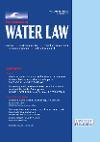Journal of Water Law - Volume 29 - Issue 1

ARTICLES
Floods in Spain: the catastrophic effects and the role of water law in prevention and mitigation
SANTIAGO M. ÁLVAREZ CARREÑO
Catedrático de Derecho Administrativo, University of Murcia, Spain
In October 2024 the Valencian region of Spain suffered catastrophic flooding, with immense human, environmental and economic consequences. This article highlights the inadequacy of legal instruments for the mitigation and prevention of flood risks and argues that water governance must respond more quickly to fluctuations in water dynamic and changes in precipitation patterns. Institutions must find new ways of building socioecological resilience and generate adaptive capacity in response to continuous changes at river-basin level, and there is an urgent need to enhance warning systems, emergency protocols and decision-making processes to safeguard the population and avoid fatalities.
Harnessing the law-science nexus to achieve water sustainability in the Anthropocene
DR GABRIEL LÓPEZ PORRAS
Universidad Autónoma de Chihuahua, México
PROFESSOR BAHMAN ROSTAMI-TABAR
Cardiff Business School, University of Cardiff
The research presented in this article investigates how the lawscience nexus (bridging scientific knowledge and legal frameworks) can be operationalised to improve water governance in the Anthropocene. Previous studies have primarily focused on the law-science interface at the international level, but there is limited research on how to implement it in domestic legislation, particularly in Mexico. The article aims to fill this gap by identifying specific legal reforms needed to incorporate scientific insights and diverse knowledge systems, including Indigenous and practical knowledge, into Mexico's water laws. The analysis highlights the need for reforms in critical legal provisions, such as water rights, restricted-access areas, and water availability assessments. It also proposes enabling a restructured Water Advisory Council to function as an independent scientific body, providing continuous policy updates based on real-time data and adaptive management strategies. These findings underscore the importance of integrating the law-science nexus into Mexico's water governance, offering a more flexible and resilient legal framework to navigate the challenges posed by the Anthropocene and ensure sustainable water management.
CASE COMMENTARIES
Cunliffe in-depth: what the Cunliffe Report means and what comes next
STEVE GUMMER and ALLAN OWEN
Sharpe Pritchard LLP, London
The Independent Water Commission’s final report, chaired by Sir Jon Cunliffe, which was published in July 2025, sets out the most ambitious overhaul of the UK water sector since privatisation, outlining a total reset across regulation, company ownership, system planning, environmental obligations and investment frameworks. This Comment flags up some of the key proposals and looks ahead to what comes next.
The competition water sewage cases: lessons learned post Manchester Ship Canal No 2
OLIVER HOLLAND and ROSIO CAFARELLI
Leigh Day, London
In March 2025 the Competition Appeal Tribunal declined to make a Collective Proceedings Order in an opt-out class action on behalf of customers against six sewerage companies, which, it was alleged, were abusing their dominant position by misleading the water regulator about their environmental performance in respect of the number of untreated sewage discharges, and thus charging householders more than they should have done. The CAT suggested that had the proposed class action been pleaded as an unfair pricing claim the outcome may have been different. Their judgment confirms that claims in nuisance continue to be consistent with the Supreme Court position as laid out in Manchester Ship Canal No 2.
Coastal erosion in North Norfolk
DAVID POCKLINGTON
Centre for Law & Religion, Cardiff Law School
The Coastal Transition Accelerator Programme (CTAP) is part of the UK Government’s National Flood and Coastal Erosion Risk Management Strategy for England. This Comment outlines one of the CTAP projects which is working with communities in north Norfolk where the coast cannot be defended from coastal erosion.
STRATEGIC ISSUES –SCOTLAND
PROFESSOR SARAH HENDRY
Dundee Law School & the UNESCO Centre for Water Law, Policy and Science,
University of Dundee
